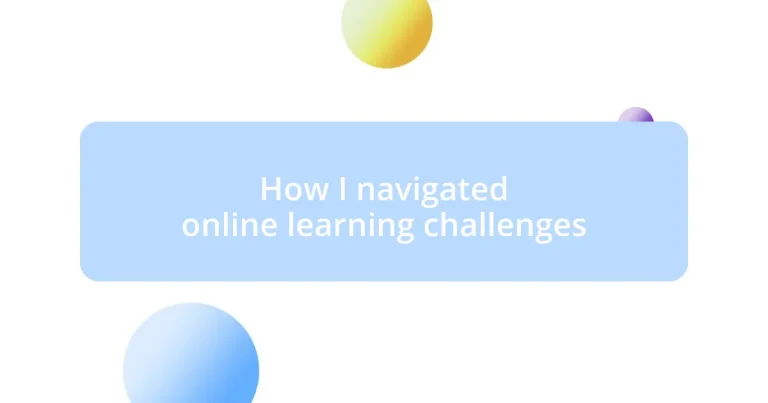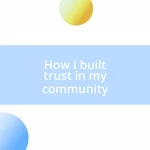Key takeaways:
- Experiencing technical issues and lacking face-to-face interaction were major challenges in online learning, prompting the need for motivation and personal connection.
- Identifying personal learning preferences through experimentation and feedback enhanced engagement and retention of information.
- Developing effective time management strategies, such as using visual planners and scheduling breaks, significantly improved focus and reduced stress.
- Building a supportive online community and actively participating in discussions fostered collaboration and strengthened motivation among peers.
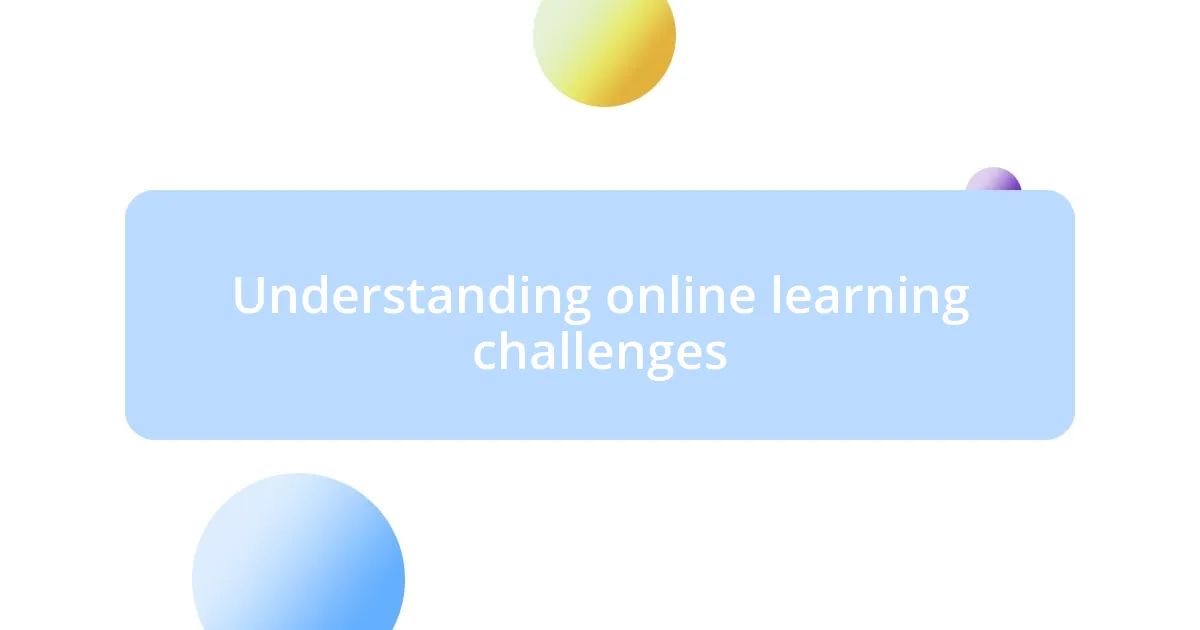
Understanding online learning challenges
Understanding online learning challenges can feel like navigating a maze without a map, which I vividly remember during my early days of adapting to digital classrooms. I often experienced technical glitches that disrupted my focus; I’d be halfway through a lecture when my connection would drop, leaving me frustrated and anxious about missing crucial information. Have you ever felt that sinking feeling when technology just doesn’t cooperate?
One major challenge I discovered was the lack of face-to-face interaction with instructors and peers. I missed those spontaneous conversations and the body language cues that really helped me absorb the material. It was isolating at times, making me question if I could truly thrive in this environment. I often found myself asking, “How can I stay motivated when I feel so disconnected?”
Moreover, balancing online learning with personal responsibilities proved to be a real juggling act. I remember trying to study while my younger siblings were in the next room, loud and full of energy. It made me wonder, how do others find that balance? Through trial and error, I learned the importance of setting boundaries and creating a dedicated study space, which ultimately transformed my learning experience.
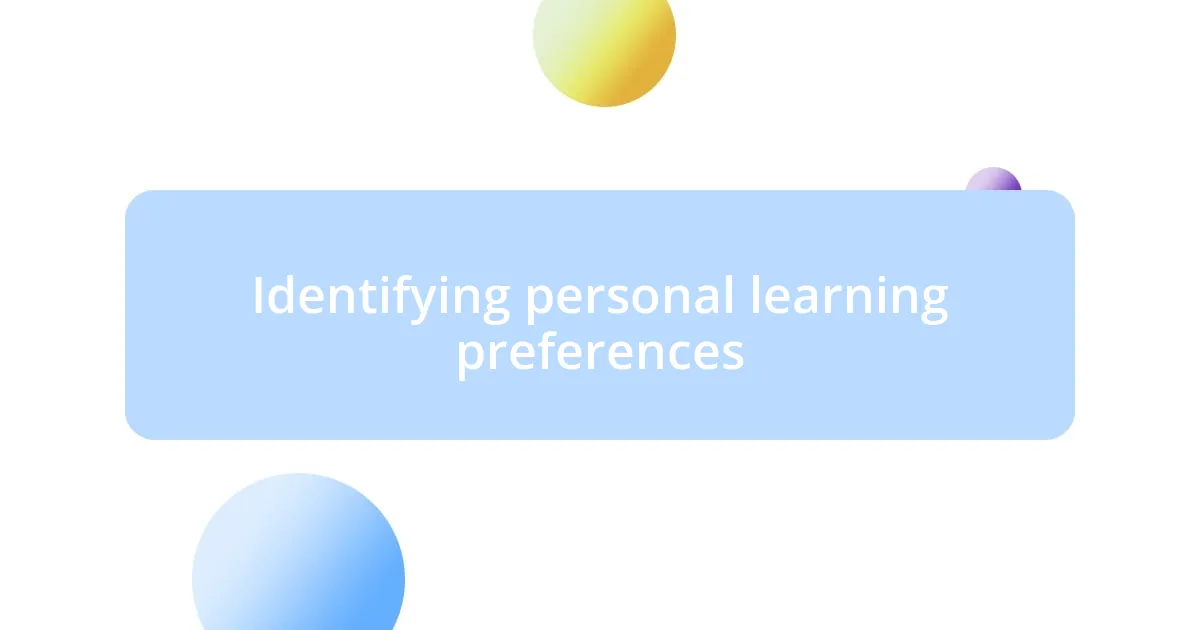
Identifying personal learning preferences
Identifying my personal learning preferences was a crucial step in maximizing my online learning experience. I realized early on that I thrived with visual aids and interactive content. My favorite moments came when I could watch videos or participate in interactive quizzes. It felt like the information clicked into place, like solving a puzzle I was struggling to complete.
To help pinpoint my learning style, I reflected on past experiences and adopted a few strategies:
- Experimentation: I tried different formats, from lectures to podcasts, to see what resonated with me.
- Feedback: Seeking feedback from peers and instructors helped me understand how others perceived my engagement.
- Journaling: I kept a learning journal where I noted what methods felt most effective—this turned out to be an eye-opening exercise.
- Adjustment: I learned to adjust my study environment, like dimming the lights or adding music, to enhance focus based on what worked for me.
Understanding these aspects not only improved my retention but also made studying feel more enjoyable and personalized.
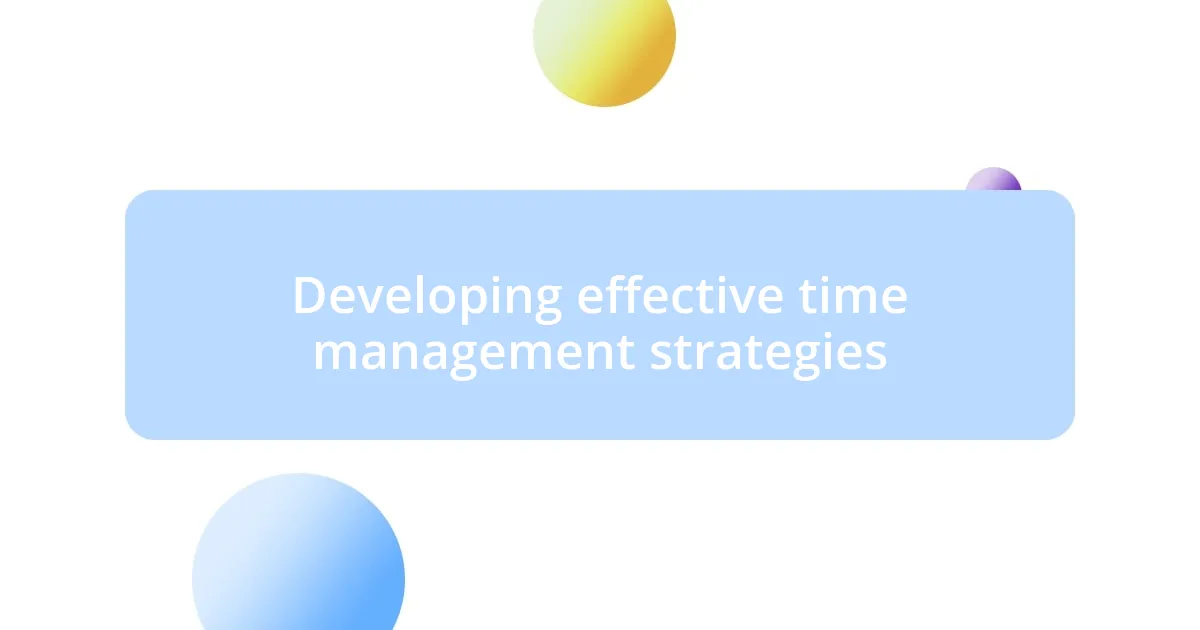
Developing effective time management strategies
Developing effective time management strategies became a gamechanger for me during my online learning journey. I vividly remember the initial chaos—assignments piling up, coupled with the vague timeline of deadlines. It often felt like I was drowning in a sea of tasks without a life raft. However, breaking my schedule down into manageable chunks and setting specific deadlines transformed the way I approached my coursework. This strategy not only kept stress at bay, but it also gave me a sense of accomplishment each time I completed a task.
A crucial aspect of my time management was creating a visual planner that I could constantly refer to. Color-coding my subjects and marking deadlines in bright, eye-catching colors helped me stay organized and focused. I found that visually representing my tasks offered a sense of clarity and motivation. It’s like having a roadmap for my studies! Have you ever tried something similar? If not, I highly recommend it; it adds an element of fun and makes planning less intimidating.
Lastly, I realized the importance of scheduling breaks. Initially, I would plow through hours of study, only to feel exhausted and unproductive. Incorporating short breaks not only rejuvenated my mind but also helped me retain information more effectively. I remember one day vividly—I took a ten-minute stretching break and returned feeling refreshed, as if I had hit the reset button. It’s a small change but made a world of difference in my learning pace and overall experience.
| Time Management Strategy | Benefits |
|---|---|
| Setting Deadlines | Reduces stress and provides a sense of accomplishment |
| Visual Planning | Enhances clarity and improves motivation |
| Incorporating Breaks | Boosts retention and refreshes the mind |
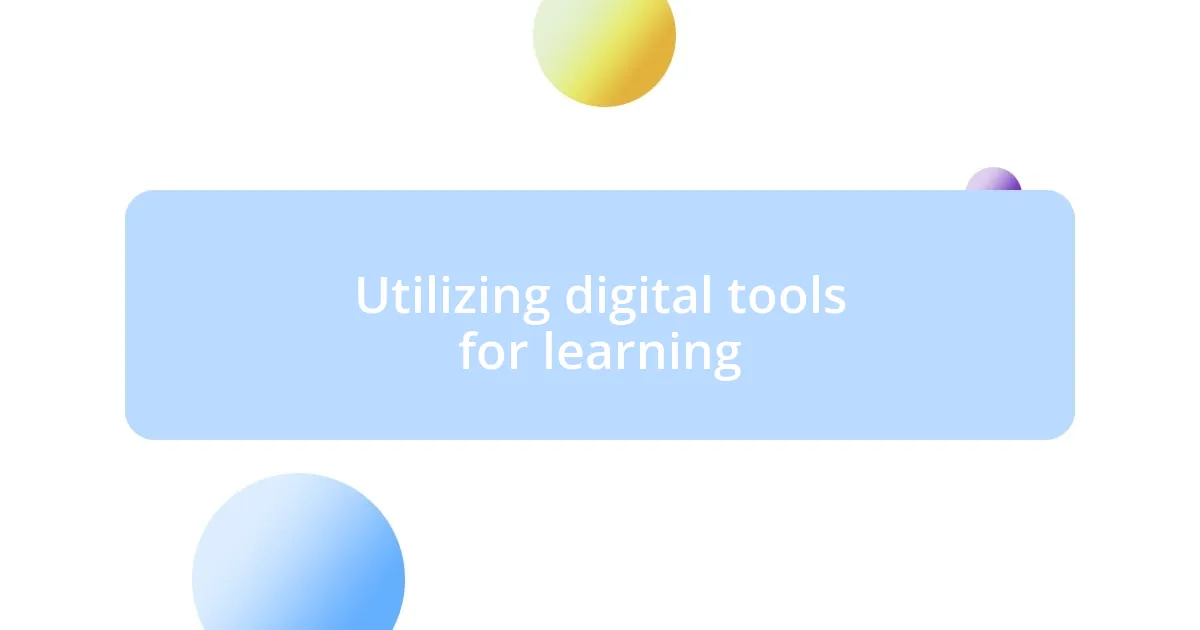
Utilizing digital tools for learning
Utilizing digital tools transformed my approach to learning in remarkable ways. I discovered platforms like Google Classroom and Asana, which helped me manage my assignments more effectively. Each notification felt like a nudge, reminding me of what was next on my agenda — a small but significant boost to keep me on track. Have you ever experienced that rush of satisfaction when you check off a completed task? There’s something inherently rewarding about seeing your progress laid out before you.
I also embraced educational apps that made studying feel less daunting and more interactive. Apps like Khan Academy and Quizlet became my go-to resources for reinforcing concepts. I often found myself connected to those virtual learning communities, collaborating with peers around the globe. It felt comforting to know that despite physical distances, I wasn’t alone in my learning struggles. It’s fascinating how technology can create such a strong sense of belonging, isn’t it?
Video conferencing tools, like Zoom, were pivotal in fostering my connections with instructors and classmates. I remember my first virtual class; I was nervous but excited. The ability to engage in real-time discussions allowed me to clarify doubts instantly. Plus, seeing everyone’s faces brought a personal touch, reminding me that we were all navigating similar challenges. This shared experience not only built camaraderie but also made learning feel more human. Would you agree that such interactions enrich our educational experience? I definitely think they do!
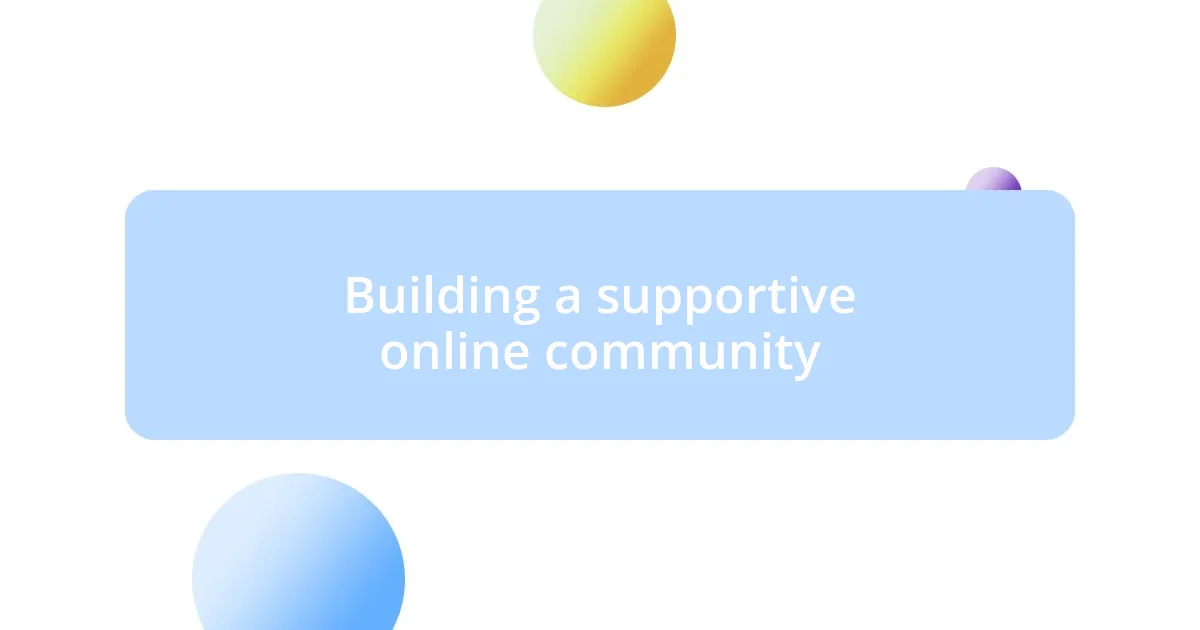
Building a supportive online community
Building a supportive online community was essential for me throughout my online learning journey. I vividly recall the nervousness I felt logging into my first discussion forum, unsure if anyone would respond to my posts. Fortunately, people were eager to connect, and soon I found myself exchanging encouragement and advice with peers. It was like discovering a hidden treasure of support, reminding me that we were all facing similar challenges. Have you ever felt that rush of belonging? That feeling can really fuel your motivation.
I also made it a point to actively participate in group chats and study sessions. One memorable evening, I joined a video call with classmates just before finals. Our casual discussions turned into a brainstorming session, where we helped each other tackle tough concepts and share study tips. It was during those moments that I realized the true power of collaboration. There’s something special about knowing you’re not just learning in isolation; it creates a shared sense of purpose. Do you think the right support can significantly impact our learning experience? I firmly believe it can.
Creating a supportive atmosphere also meant being there for others. I remember reaching out to a classmate who seemed to struggle during our group discussions. A simple message of encouragement made a difference in their confidence, and it felt incredibly rewarding to play a part in their success. We often underestimate the power of a kind word or gesture. Engaging with and uplifting one another transforms learning into a collective journey rather than a solitary task. How have you contributed to your online community? It’s truly enlightening to reflect on how we can help each other grow.
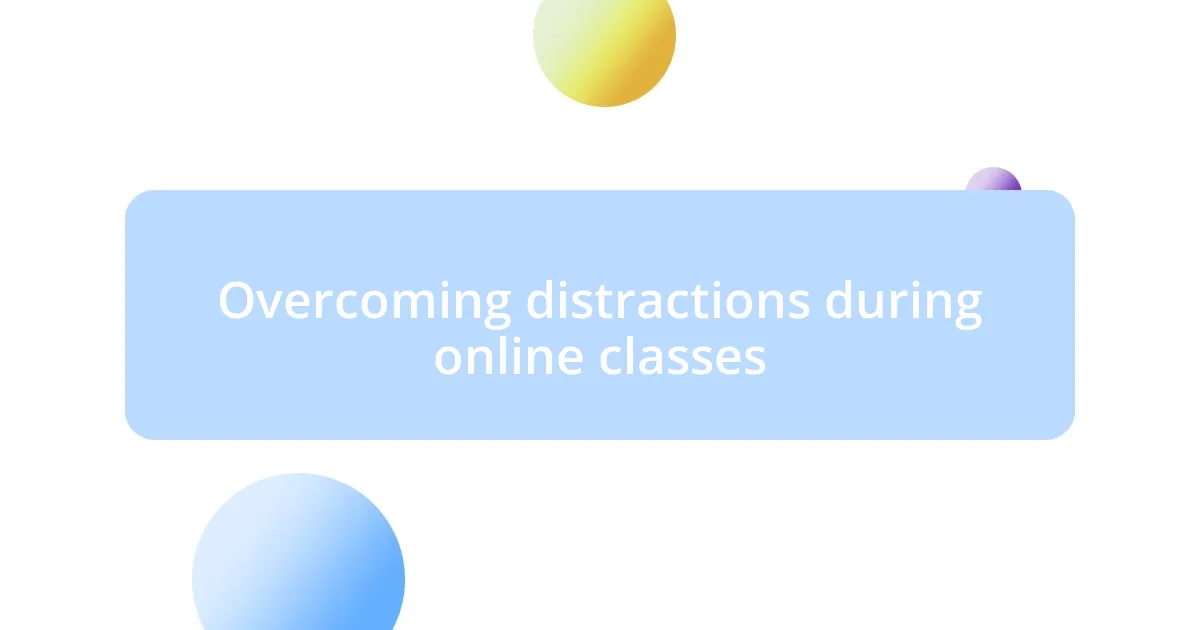
Overcoming distractions during online classes
Distractions are a constant hurdle in online classes. I remember the days when I’d sit down, eager to learn, only to find my attention drifting toward my phone notifications. It was surprising how quickly the allure of social media could pull me away from a lecture. To combat this, I decided to silence my phone and keep it out of reach, creating a physical barrier that helped me focus vastly better. Have you ever noticed how just a small change in your environment can dramatically shift your concentration? It truly makes a difference.
Additionally, I discovered the value of setting up a dedicated study space. I transformed a quiet corner of my home into my educational oasis. Decorating it with inspiring quotes and organizing my materials made it feel like my personal classroom. The psychological impact of having a designated area for learning cannot be overstated. Suddenly, I found myself more inclined to sit down and engage fully with my classes. It’s amazing how our surroundings can reinforce our intentions, isn’t it?
Moreover, I began to implement the Pomodoro Technique, which involves working in bursts followed by short breaks. I found that concentrating intensely for just 25 minutes made the material stick so much better. Plus, knowing a break was coming encouraged me to push through the more challenging subjects. After trying this method, I felt a refreshing sense of accomplishment after each session. Have you ever experimented with your study methods to see what resonates? It turned out to be a game-changer for me, and I encourage you to give it a try!
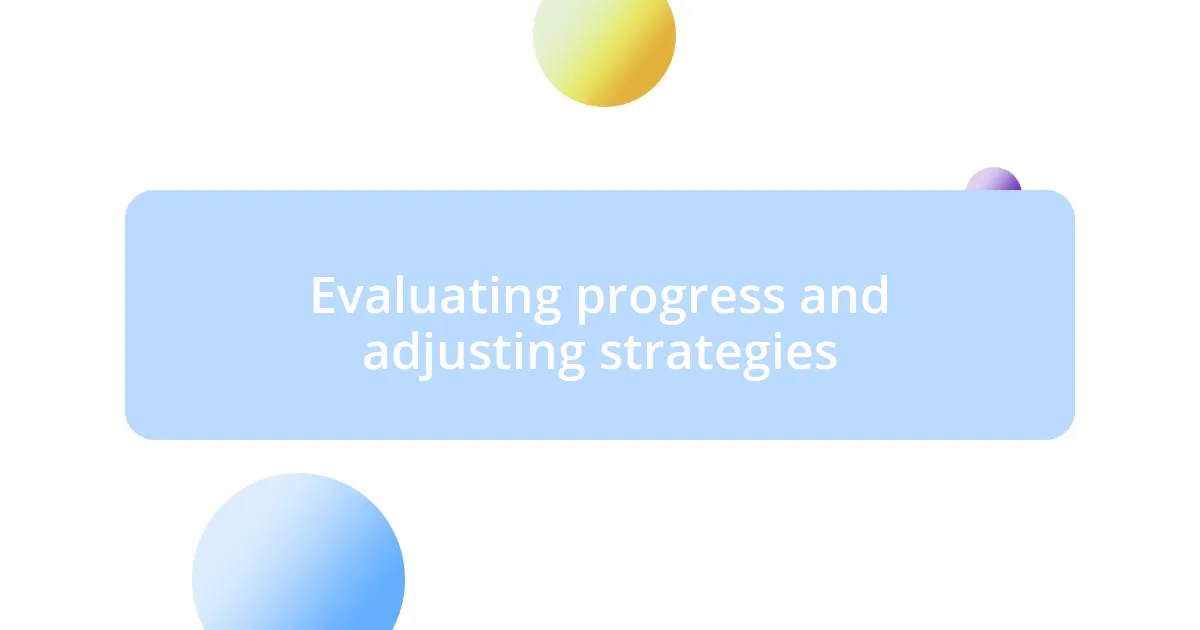
Evaluating progress and adjusting strategies
Evaluating my progress during online learning was a crucial aspect of my growth. At the end of each week, I would set aside time to reflect on what I had accomplished. I remember feeling both proud and frustrated as I assessed my understanding of subjects. It made me realize that even setbacks could be seen as stepping stones. Have you ever taken a moment to celebrate small victories? I found that this practice not only boosted my confidence but also helped me identify areas needing improvement.
Adjusting my strategies was just as important as evaluating my progress. For instance, in one of my courses, I initially struggled with complex concepts in mathematics. I decided to switch from watching lecture videos to using interactive platforms that offered practice problems and real-time feedback. This change made a significant difference in my comprehension. It was almost like turning on a light bulb! Have you ever changed your approach to something and felt an instant lift? Adapting to different learning tools opened new doors for me.
Moreover, I learned the importance of seeking feedback from instructors and peers. After submitting my assignments, I wouldn’t shy away from asking for critiques. One memorable instance was when a professor offered specific suggestions on my writing style. I took those insights to heart and found myself improving dramatically. It’s incredible how feedback can act as a mirror, reflecting our strengths and areas for growth. Reflecting on how we respond to feedback can indeed shape our learning journey, right?












